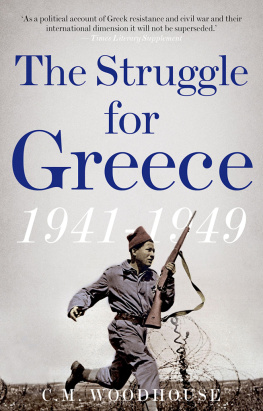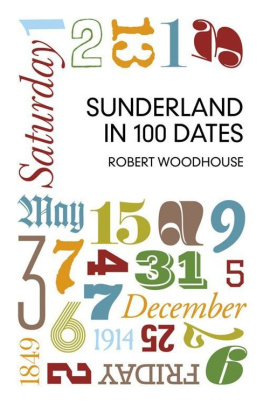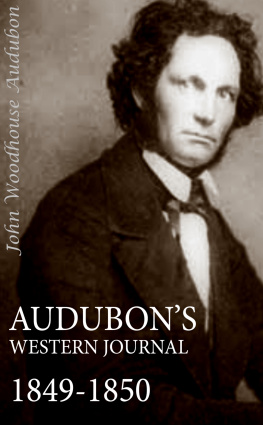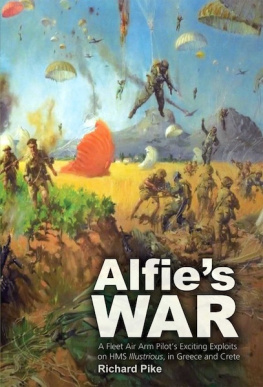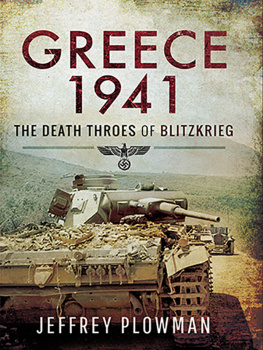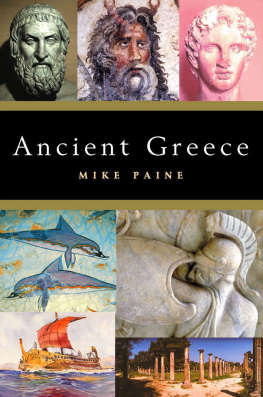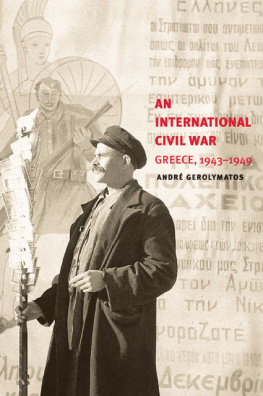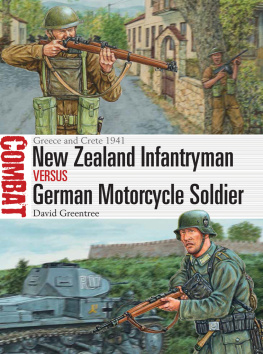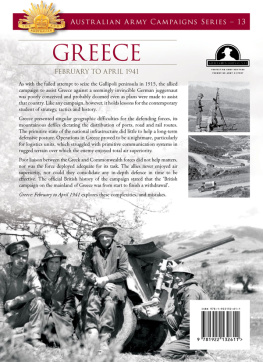Woodhouse - Struggle for Greece : 1941 - 1949
Here you can read online Woodhouse - Struggle for Greece : 1941 - 1949 full text of the book (entire story) in english for free. Download pdf and epub, get meaning, cover and reviews about this ebook. year: 2018, publisher: Oxford University Press, genre: Detective and thriller. Description of the work, (preface) as well as reviews are available. Best literature library LitArk.com created for fans of good reading and offers a wide selection of genres:
Romance novel
Science fiction
Adventure
Detective
Science
History
Home and family
Prose
Art
Politics
Computer
Non-fiction
Religion
Business
Children
Humor
Choose a favorite category and find really read worthwhile books. Enjoy immersion in the world of imagination, feel the emotions of the characters or learn something new for yourself, make an fascinating discovery.
- Book:Struggle for Greece : 1941 - 1949
- Author:
- Publisher:Oxford University Press
- Genre:
- Year:2018
- Rating:4 / 5
- Favourites:Add to favourites
- Your mark:
- 80
- 1
- 2
- 3
- 4
- 5
Struggle for Greece : 1941 - 1949: summary, description and annotation
We offer to read an annotation, description, summary or preface (depends on what the author of the book "Struggle for Greece : 1941 - 1949" wrote himself). If you haven't found the necessary information about the book — write in the comments, we will try to find it.
Struggle for Greece : 1941 - 1949 — read online for free the complete book (whole text) full work
Below is the text of the book, divided by pages. System saving the place of the last page read, allows you to conveniently read the book "Struggle for Greece : 1941 - 1949" online for free, without having to search again every time where you left off. Put a bookmark, and you can go to the page where you finished reading at any time.
Font size:
Interval:
Bookmark:

THE STRUGGLE FOR GREECE
19411949


First published in the United Kingdom in 1976 by Hart-Davis, MacGibbon Ltd
Republished in 2002 in the original impression by
C. Hurst & Co. (Publishers) Ltd.,
41 Great Russell Street, London, WC1B 3PL
Executors of C.M. Woodhouse, 1976
Introduction Richard Clogg, 2002
This paperback edition, 2018
All rights reserved.
The right of C. M. Woodhouse to be identified as the author of this publication is asserted by him in accordance with the Copyright, Designs and Patents Act, 1988.
A Cataloguing-in-Publication data record for this book is available from the British Library.
ISBN: 978-1-78738-255-8
www.hurstpublishers.com
Most of the sources on which I have relied are to be found in the Gennadeion Library in Athens, the British Library (Reference Division) in London, or the Burrows Library at King's College, University of London. The newspapers quoted are mostly to be found in the British Newspaper Library at Colindale. I am grateful to their respective Librarians for their help in making them available to me.
Other documentary sources were in my own possession. I have deposited them in the Burrows Library at King's College.
I am indebted to Mr Constantine Lambrias for providing me with a copy of the document cited as 'Vlandas's MS'; and to Mr Richard Clogg and Mrs Domna Dontas for verifying certain facts for me in documents held in the Public Record Office in London and the Greek State Archives in Athens respectively.
C.M.W.
Between pages 148 and 149
MAPS
by Richard Clogg
IN THE SUMMER of 1944, as the liberation of Greece appeared imminent, Colonel C.M.Woodhouse, the commander of the Allied Military Mission to the Greek Resistance, was brought out of Greece for consultations with, among others, the Prime Minister, Winston Churchill, and the Foreign Secretary, Anthony Eden. In connection with his visit to London, Lord Selborne, who as Minister for Economic Warfare had overall responsibility for the Special Operations Executive which had sent Woodhouse into Greece, wrote on 8 August to Eden. In emphasising the brilliance of Woodhouse's academic record, Selborne credited him with scholarships to Winchester and New College, a double first in classics and the Ireland, Craven and Hertford scholarships at Oxford (in fact he had won the Gaisford Prize and not the Ireland Scholarship). His academic record at Oxford had been so brilliant, Selborne maintained, that it had not been equalled by F.E. Smith (later Earl of Birkenhead) or by Sir John (later Viscount) Simon. The few who had matched it, as Selborne somewhat infelicitously put it, had become 'either lunatics or schoolmasters': 'When, therefore, one finds such an academic record combined with the gifts of a man of affairs and of action, one has found something very unusual.'1
Christopher Montague Woodhouse, generally known as Monty, or in wartime Greece as Chris, was born on 11 May 1917, the second son of the 3rd Baron Terrington. On graduation from Oxford in the summer of 1939 he had seemed destined to pursue an academic career. Indeed, on graduating he left for Italy and Greece to prepare for the All Souls fellowship examination and arrived in Greece on 24 August, barely a week before the outbreak of war on 3 September. He was delighted to discover that 'living people still spoke Plato's language',2 but in contrast to not a few of those nurtured from an early age on the classics (he had been introduced to Euripides at the age of eleven) he was not affronted by the fact that the modern inhabitants of Athens bore no very clear resemblance to the worthies of the age of Pericles. On the contrary he was intrigued and fascinated by the modern country. It was while walking through the Plaka, the jumble of streets at the foot of the Acropolis, that he heard on the radio of the outbreak of war, through an open window, 'the thin, plaintive voice of Chamberlain lamenting the collapse of his illusions and mine'.
He returned home to enlist in the Royal Artillery, a choice determined by his excellence in mathematics. In the course of his training he encountered 'a dynamic, tubby little major called Keble, whose eyes almost popped out of his head with lust for killing'. This was the legendary C.M. 'Bolo' Keble who was later to serve as chief of staff to Lord Glenconner, the head of SOE's Middle Eastern headquarters in Cairo. Greece entered the war on 28 October 1940 after the dictator General Ioannis Metaxas had rejected a humiliating Italian ultimatum. Churchill, anxious to shore up resistance to the Nazis in south-eastern Europe and conscious of the need to honour commitments made to small countries prepared to stand up to the Axis, offered limited military support. Woodhouse was an obvious choice to join, as an intelligence officer, the British Military Mission to the Greek Army, headed by Major-General T.G. Heywood. But Britain was able to offer little in the way of concrete assistance to the Greeks, who had already repulsed the attempted Italian invasion by the time the Military Mission arrived in Greece. Woodhouse occasionally interpreted at staff conferences, 'which were all quite fruitless'. The remainder of his time was spent 'in still more futile occupations: charting Italian wireless-traffic, translating communiqus, sticking pins in maps'.
Metaxas declined the British offer of ground troops for fear of provoking Hitler into coming to the aid of his ally Mussolini, whose forces were hard-pressed by the Greeks on the Albanian front. Following the dictator's death at the end of January, his successor did agree to accept a British, mainly Commonwealth, Expeditionary Force. The German invasion on 6 April was over almost before it began. During a campaign which lasted barely three weeks, Woodhouse acquired an inkling of the will to resist that was so firmly embedded in the Greeks. He found a much reduced platoon of Australians attempting to hold the pass of Thermopylae. An old peasant in the capote or shaggy cloak of the shepherd and bearing an ancient Mannlicher which had belonged to his grandfather, asked if he could join the Australians, an offer which was accepted. 'Leonidas', Woodhouse wrote, 'would have recognized a kindred spirit.'
He was evacuated, along with much of the Expeditionary Force, to Crete, which British military planners hoped to hold as a kind of unsinkable aircraft-carrier from which it might prove possible to bomb the Romanian oilfields upon which the Germans were heavily reliant. But such hopes were dispelled when the island fell, in a close-fought battle, to German airborne attack. On the day that the attack began, 20 May, Woodhouse was breakfasting with General Bernard Freyberg, the New Zealander commanding the island's defences. On looking up, Woodhouse was surprised to see the brilliant blue sky awash with gliders and parachutists. Freyberg carried on eating his breakfast, remarking only 'Well, they're on time.' For Freyberg was privy to Ultra
Font size:
Interval:
Bookmark:
Similar books «Struggle for Greece : 1941 - 1949»
Look at similar books to Struggle for Greece : 1941 - 1949. We have selected literature similar in name and meaning in the hope of providing readers with more options to find new, interesting, not yet read works.
Discussion, reviews of the book Struggle for Greece : 1941 - 1949 and just readers' own opinions. Leave your comments, write what you think about the work, its meaning or the main characters. Specify what exactly you liked and what you didn't like, and why you think so.

